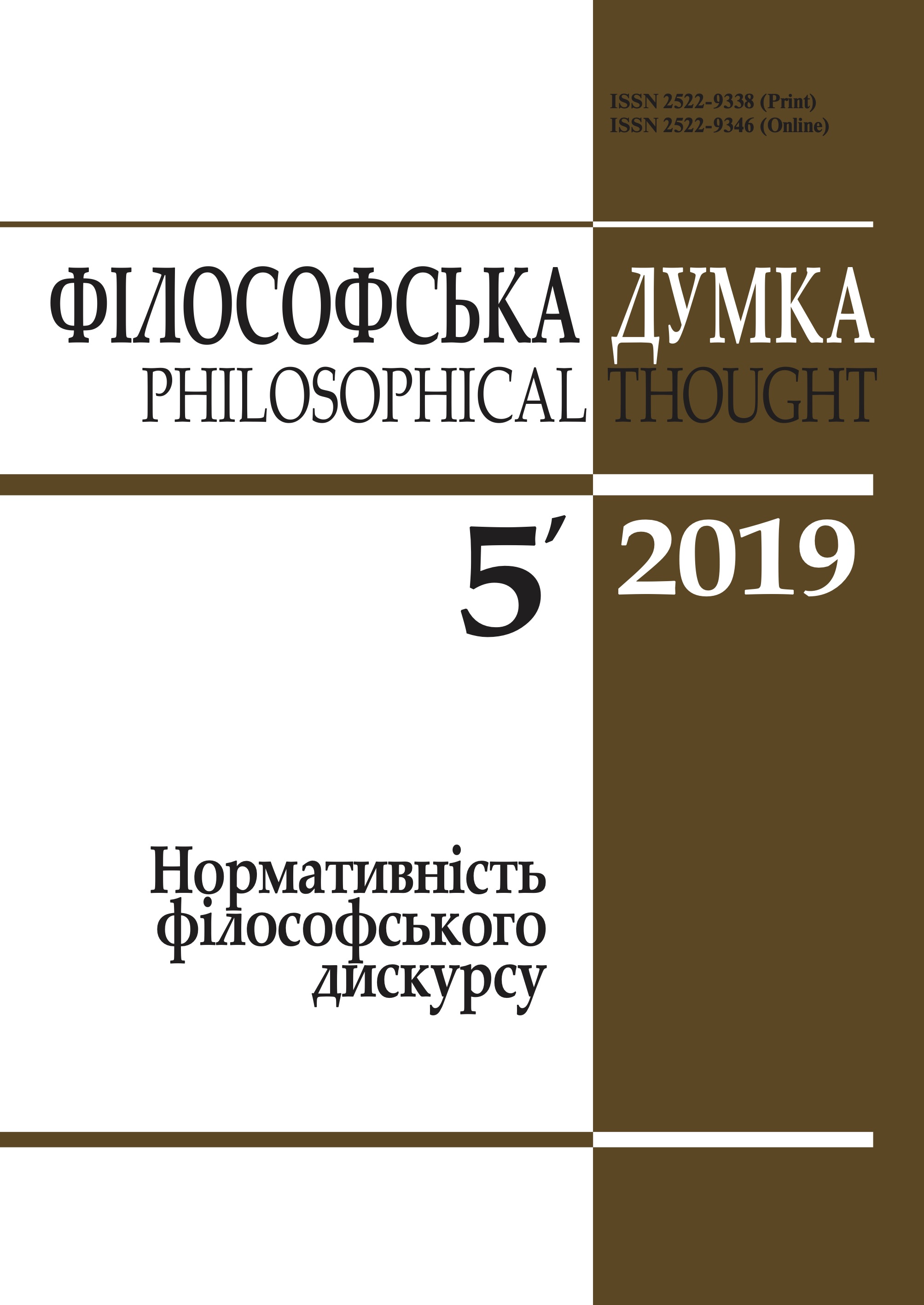Normative coherence of philosophical discourse
DOI:
https://doi.org/10.15407/fd2019.05.021Keywords:
philosophical discourse, normative principles of discourse, descriptive norm / law, prescriptive norm / law, ethics of discourse, normative coherence of discourse, discourse as a meta-institutional instanceAbstract
The author of the article assumes that any human activity is normative. In the case of philosophical discourse, the normative ground is its indispensable condition, which makes it possible to compare the foundations of philosophy and other scientific disciplines. The norm (law) has, on the one hand, descriptive content related to the description of the noumenal world, and, on the other, prescriptive content related to the counterfactuality of what ought to be. The author emphasizes that the functional aspect of a norm is that it is a means of socially integrating the behavior of people and social groups into a whole. Due to the requirements and requirements of society, social groups are transformed into standards, models, standards of modal and obligatory behavior of the representatives of these groups, performing the function of motivation, orientation and legitimacy.
In the second part of the article, the author focuses on a narrower understanding of discourse as speech, dialogue, discussions, which presuppose argumentation based on certain principles, rules, rules and regulations. This interpretation of discourse is peculiar to representatives of the ethics of discourse (K.-O. Apel, Y. Habermas, D. Böhler, V. Kulman, G. Gronke, etc.). Within ethics, principles, imperatives, rules, norms and guidelines both normalize the discourse and substantiate this discourse. Adherence to these principles, rules, norms, and guidelines ensures the normative coherence of discourse as the instance of consensus building on the basis of revealing the performative contradiction of the statement. The normative coherence of discourse is also the basis for its functioning as a meta-institution of justification of social (moral, legal) norms and legitimation of institutions of deliberative democracy in a society of communication and dialogical civilization.
Summarizing, the author formulates generalized requirements-guidelines that make it possible to implement the principles, norms and rules of discourse as a meta-institutional instance of society.
References
Alexy, R. (1978). Eine Theorie des praktischen Diskurses. In: W. Oelmüller (Hrsg.). Normenbegründung – Normendurchsetzung, Materialien zur Normendiskussion (Bd. 2, SS. 22–58). Paderborn: Schöningh.
Apel, K.-O. (1987). Fallibilismus, Konsenstheorie der Wahrheit und Letztbegründung. In: W. von Kuhlmann (Hrsg.). Forum für Philosophie Bad Homburg. Philosophie und Begründung (S. 76). Frankfurt a. M.: Suhrkamp.
Apel, K.-O. (1990). Nichtmetaphisische Letztbegründung? In: Nachmetaphisische Philosophie (S. 42). Köln: Opladen.
Böhler, D. (1985). Rekonstruktive Pragmatik. Von der Bewußtseinsphilosophie zur Kommunikationreflexion: Neubegründung der praktischen Wissenschaften und Philosophie. Frankfurt am Main: Suhrkamp.
Böhler, D. (1994). In dubio contra projectum. Mensch und Natur im Spannungsfeld von Verstehen, Konstruieren, Verantworten. In: Ethik für die Zukunft. Im Diskurs mit Hans Jonas (S. 265). München: Beck.
Böhler, D. (2014). Responsibility for the future from a global perspective / transl., afterword, and notes by A. Yermolenko (p. 52). [In Ukrainian] Kyiv: Stylos. [= Бьолер 2014]
Böhler, D. (2017). Reflections on our environment in the face of external and internal threats / transl. by A. Yermolenko. [In Ukrainian] Philosophical Thought, 2, 54. [= Бьолер 2017]
Dictionary of Foreign Language Words (1974) (p. 470). [In Ukrainian] Kyiv: Ukrainian Soviet Encyclopedia Editorial Board. [= Словник 1974]
Fukuyama, F. (2005). The big crash. Human nature and the restoration of social order (p. 157). [In Ukrainian] Kyiv: Tandem. [= Фукуяма 2005]
Habermas, J. (1971). Vorbereitende Bemerkungen zu einer Theorie der kommunikativen Kompetenz. In: J. Habermas, N. Luhmann, Theorie der Gesellschaft oder Sozialtechnologie? (S. 137). Frankfurt a. M.: Suhrkamp.
Habermas, J. (1973). Legitimationsprobleme im Spätkapitalismus. Frankfurt a. M.: Suhrkamp.
Habermas, J. (1983). Wahrheitstheorien. In: H. Fahrenbach (Hrsg.), Wirklichkeit und Reflexion (S. 214). Pfüllingen: Neske.
Habermas, J. (1984). Uber Moralität und Sittlichkeit – Was macht eine Lebensform «rational»? In: H. Schnädelbach (Hrsg.), Rationalität (S. 219). Frankfurt a. M.: Suhrkamp.
Habermas, J. (1984). Vorstudien und Ergänzungen zur Theorie des Kommunikativen Handelns. Frankfurt a. M.: Suhrkamp.
Habermas, Y. (1999). Actions, speech acts, speech interactions, and the lifeworld. [In Ukrainian] In: A.M. Yermolenko, Communicative practical philosophy. Textbook (p. 295). Kyiv: Libra. [= Габермас 1999]
Kuhlmann, W. (1985). Reflexive Letztbegründung. Untersuchungen zur Transzendentalpragmatik. Freiburg, München: Alber.
Luhmann, N. (1972). Soziologie der Moral. In: N. von Luhmann (Hrsg.), Theorietechnik und Moral (S. 53). Frankfurt a. M.: Suhrkamp.
Norm (1984). In: Historisches Wörterbuch der Philosophie (B. 6, S. 906). Basel, Stuttgart: Schwabe.
Opp, K.-D. (1983). Die Entstehung sozialer Normen: Ein Integratuinsversuch sozial., sozialpsycholog. und ökonom. Erklärungen. Tübingen.
Parsons, T. (1949). The structure of social aktion. New York, London.
Wright, G.H. (1994). Von. Sein und Sollen. In: G.H. Wright, Normen, Werte und Handlungen (S. 45). Frankfurt a. M.: Suhrkamp.
Downloads
-
PDF (Українська)
Downloads: 402
Published
How to Cite
Issue
Section
License
Authors who publish with this journal agree to the following terms:
- Authors retain copyright and grant the journal right of first publication.
- Authors are able to enter into separate, additional contractual arrangements for the non-exclusive distribution of the journal's published version of the work (e.g., post it to an institutional repository or publish it in a book), with an acknowledgement of its initial publication in this journal.
- Authors are permitted and encouraged to post their work online (e.g., in institutional repositories or on their website) prior to and during the submission process, as it can lead to productive exchanges, as well as earlier and greater citation of published work (See The Effect of Open Access).


